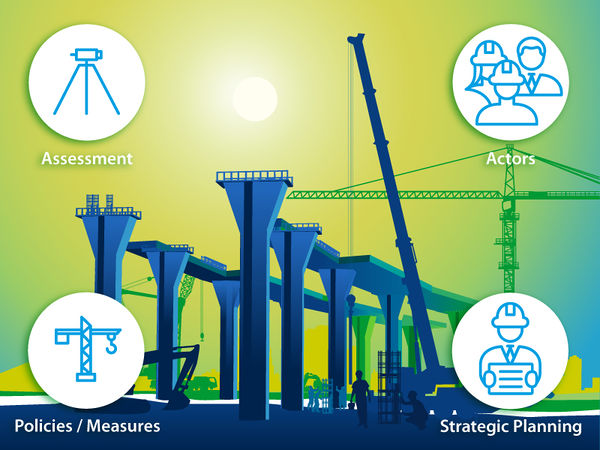Difference between revisions of "SE4Jobs Toolbox - Actors"
***** (***** | *****) |
***** (***** | *****) |
||
| Line 64: | Line 64: | ||
Governmental and non-governmental actors can support the development of local value and employment in and RE/EE by contributing to providing the necessary framework conditions and implementing the aspects of the RE/EE strategy that they are responsible for or feel concerned with. An initial step can be to identify which elements need to be provided by government, in which areas private actors should take the lead and in which areas both need to work together. This relationship between what is being organized by government and by private actors can vary significantly and needs to be adapted to your specific context. | Governmental and non-governmental actors can support the development of local value and employment in and RE/EE by contributing to providing the necessary framework conditions and implementing the aspects of the RE/EE strategy that they are responsible for or feel concerned with. An initial step can be to identify which elements need to be provided by government, in which areas private actors should take the lead and in which areas both need to work together. This relationship between what is being organized by government and by private actors can vary significantly and needs to be adapted to your specific context. | ||
</div> | </div> | ||
| − | === | + | === Practical aspects of responsibilities and good practice options <span style="line-height: 21px"><span class="mw-customtoggle-title5" style="font-size:small; font-weight: bold; display:inline-block; float:center; color: blue"><span class="mw-customtoggletext">'''[Expand]'''</span></span></span><br/> === |
| + | <div id="mw-customcollapsible-title5" class="mw-collapsible mw-collapsed"> | ||
| + | [Text] | ||
| + | </div> | ||
| + | === Challenges in implementing the issue responsibilities <span style="line-height: 21px"><span class="mw-customtoggle-title5" style="font-size:small; font-weight: bold; display:inline-block; float:center; color: blue"><span class="mw-customtoggletext">'''[Expand]'''</span></span></span><br/> === | ||
<div id="mw-customcollapsible-title5" class="mw-collapsible mw-collapsed"> | <div id="mw-customcollapsible-title5" class="mw-collapsible mw-collapsed"> | ||
[Text] | [Text] | ||
| Line 90: | Line 94: | ||
{{Re-activate Footer}} __NOTITLE__ | {{Re-activate Footer}} __NOTITLE__ | ||
| + | [[Category:Tools]] | ||
[[Category:RE-ACTIVATE]] | [[Category:RE-ACTIVATE]] | ||
| − | |||
Revision as of 14:16, 16 November 2017
SE4Jobs Toolbox – Laying the foundations for a sustainable development
| Responsibilities | Coordination | Participation |
ToolsPRODUSE EQuIP CADRE Interactive AILEG HELIO ELMA |
What is the issue responsibilities about? [Expand]The issue of responsibilities is firstly a process of identifying relevant stakeholders, and secondly of assigning clear responsibilities (and the required means) to different actors for defined areas. Potentially relevant actors may work at different levels within government or outside of it. It is crucial to make sure that responsibilities, task descriptions and the ways of interacting are consistently defined and broadly accepted. Why are responsibilities of actors important for the expansion of RE and EE in your country? [Expand]
The successful implementation of RE/EE strategies and policies requires the cooperation of a broad range of stakeholders. This is all the more the case if the aim is to maximize their socio-economic co-benefits. The relevant players, as well as their actual or potential role and contribution, need to be identified correctly for all the different elements that make up the overall approach. Such elements include financing investments, training a skilled workforce, developing technical standards, and raising awareness both about RE/EE technologies and the government’s strategy for the sector. In addition, it is crucial to ensure that stakeholders are involved in the formulation of a strategy from an early stage, in order to correctly assess what support is needed. What are key questions for addressing responsibilities of actors? [Expand]
Key questions for this issue relate to which groups of actors are important for the overall success of a strategy and the particular field in which their contributions are most needed (as an implementer, as a multiplier, as a regulator, etc.). Examples for such questions are:
How can responsibilities of actors be addressed? [Expand]
Governmental and non-governmental actors can support the development of local value and employment in and RE/EE by contributing to providing the necessary framework conditions and implementing the aspects of the RE/EE strategy that they are responsible for or feel concerned with. An initial step can be to identify which elements need to be provided by government, in which areas private actors should take the lead and in which areas both need to work together. This relationship between what is being organized by government and by private actors can vary significantly and needs to be adapted to your specific context. Practical aspects of responsibilities and good practice options [Expand]
[Text] Challenges in implementing the issue responsibilities [Expand]
[Text] |
Good Practices
Brazil China India Mexico South Africa Turkey |
Reference
|
This article is part of the RE-ACTIVATE project. RE-ACTIVATE “Promoting Employment through Renewable Energy and Energy Efficiency in the MENA Region” is implemented by the Deutsche Gesellschaft für Internationale Zusammenarbeit (GIZ) GmbH on behalf of the German Ministry for Economic Cooperation and Development (BMZ). |




















